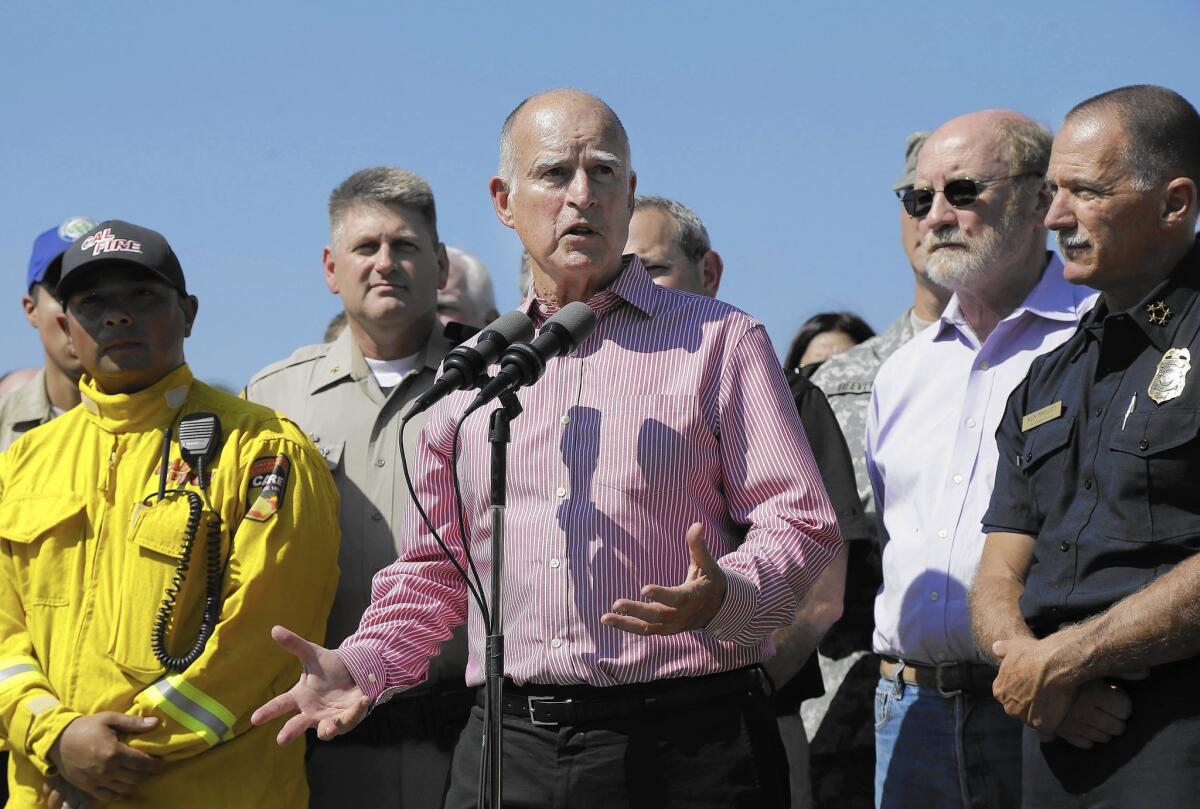Brown blew his best chance for president

- Share via
Gov. Jerry Brown won’t be running for president. Don’t be silly. He has already run the course. And now he’s a geezer.
Anyway, his chief advisor, wife Anne Gust Brown, would kill him.
So it’s not worth asking about.
But that’s too bad, in a way. Because, age aside, he never has been in better position to run.
Brown has a record he can crow about as governor of the most populous, most diverse state, with the world’s eighth-largest economy. He has steered the state budget from a crippling deficit to a healthy surplus. He’s still a Washington outsider. He’s usually articulate and interesting.
And he’s driven, more than any presidential contender, by a cause that’s far bigger than any one state: saving the planet by turning down the heat on global warming.
The presidential field is in flux and flimsy. Democratic front-runner Hillary Rodham Clinton is limping badly. Republican front-runner Donald Trump is a circus barker.
“In the current context, especially when you look at the Republican field, it cries out for someone who can be the grown-up in the room and has some gravitas,” says veteran Democratic consultant Bill Carrick.
Maybe — probably — Brown couldn’t get elected president in 2016. But there has never been a wider opening for him. It’s the opportunity of his lifetime. If only.
If only he hadn’t foolishly run those other times.
In 1976, for crying out loud, he had been governor for only a year, repeating Ronald Reagan’s mistake of 1968. Moreover, Brown entered the Democratic primaries very late. He still carried three states and attracted 14% of the total popular vote. But Jimmy Carter won easily.
“When he first got in and won in Maryland, he was the most exciting candidate I’d ever seen,” says Carrick, who was working then in Washington. “He was hot as a firecracker.”
It was a careless waste of potential.
In 1980, Brown challenged Carter again. Only this time Carter was the incumbent president. And Sen. Ted Kennedy — Democratic royalty — also was competing. Brown bombed and dropped out early.
Brown was asked by a reporter earlier this year whether there had been anything in his career he’d like to change. “There are a lot of things I could second-guess,” he replied.
“The only thing that seems pretty clear was continuing to run for president in 1980 after Kennedy got in against Carter. That was a very dumb move on my part.”
And in 1992, what was that about? Brown had been out of office nine years. He ran like a crazy man — no discipline, poor planning, dumb moves.
“We are not disorganized. Our campaign transcends understanding,” Jacques Barzaghi, Brown’s “field director” and longtime aide-de-camp, said then.
One stupid move: Brown naming the Rev. Jesse Jackson as his potential running mate — the man who had angered New York’s many Jewish voters by calling their city “Hymietown.”
Brown ran as a populist, the “voice for the voiceless,” refusing to accept campaign contributions that exceeded $100. He later abandoned that notion while rebooting his political career in California.
In 1992, however, he also campaigned as a Wall Streeter, advocating the “flat tax” — everyone pay the same income tax rate. As governor in 2012, he turned in the extreme opposite direction, selling voters a “soak-the-rich” tax hike that hit only California’s wealthiest.
The “prince of sleaze” — Brown’s name for Arkansas Gov. Bill Clinton — walloped the Californian in the decisive New York primary. Still, Brown won six states.
If Brown hadn’t been so politically antsy in 1976 and 1980, he just might already have been president.
California voters wouldn’t have been so sick of him in 1982. They probably would have elected him U.S. senator over the San Diego mayor, Pete Wilson. Then he would have been in great position to whip the Arkansas governor in 1992.
You know that Brown would love to be back running again, especially with the “prince’s” wife stumbling.
If he were 10 years younger, Brown told reporters a few months ago, “yes” he would be back on the presidential trail. But he quickly added: “If I could go back in a time machine … I might jump in. But that’s counterfactual, so you don’t need to speculate.”
Brown is 77. If he ran and won, he’d be older entering the White House than Reagan was leaving it. That’s not a selling point.
But also like Reagan and Trump — excuse this one comparison — Brown has an appealing ring of authenticity.
He’s pretty healthy and not that much older than the leading Democratic contenders. Hillary Clinton is 67. Sen. Bernie Sanders (I-Vt.) is 73. And Vice President Joe Biden, who’s edging toward the race, is 72.
“Never count Jerry out,” Carrick says. “Many people have written his political eulogy who no longer are involved in politics.”
Asked on NBC’s “Meet the Press” Sunday why he didn’t jump into the race, Brown replied: “I’ve got a lot to do in California…. I find it completely absorbing and challenging. And I’ve given myself to this job and I’m going to be fully engaged there.”
Too bad Brown didn’t say that the first time he was governor.
Now, given his passion for fighting global warming, Brown should consider running for the U.S. Senate in 2018 if Sen. Dianne Feinstein retires. She’s 82.
Washington is where global warming needs to be fought.
More to Read
Sign up for Essential California
The most important California stories and recommendations in your inbox every morning.
You may occasionally receive promotional content from the Los Angeles Times.














